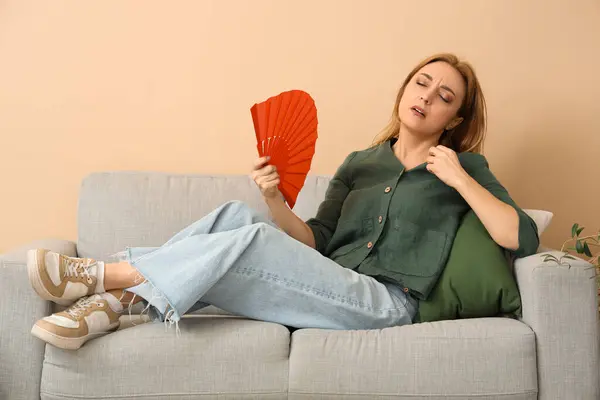Share this @internewscast.com
Hot flashes, those intense and sudden sensations of heat, are a common and distressing symptom of menopause, affecting up to 80% of women going through this phase. While hormone replacement therapy is an option for managing these symptoms, many women prefer to explore natural and quick remedies that don’t rely on medication. Thankfully, there are several natural approaches and lifestyle modifications that can help you stay cool and at ease.
How to Prevent Hot Flashes Naturally: 5 Easy Tips
If you want to avoid hot flashes and night sweats before they even start, try one (or more!) of these effective tips.

Sip Sage Tea
Sage is a well-established natural treatment for managing menopausal symptoms, particularly hot flashes. Research indicates that consuming sage tea or taking sage supplements can substantially reduce the occurrence and intensity of hot flashes. Sage is easily accessible in tea form, and many women find that having a cup in the morning and evening helps to manage these symptoms. However, if you are taking medication, it is crucial to discuss with your healthcare provider before incorporating sage into your regimen, as it may have interactions with certain drugs.
Enjoy Edamame
Soy-based food items, such as edamame, tofu, and soy milk, are high in isoflavones, compounds derived from plants that function similarly to estrogen in the body. Studies suggest that a diet rich in plant-based soy can lead to an 84% reduction in the frequency and severity of hot flashes. Women who included soy in their daily diet have reported noticeable improvements in their hot flash symptoms, as well as enhanced mood and energy levels. You might consider adding edamame to your salads or snacking on roasted soybeans as a nutritious option.
Sniff Lavender
Aromatherapy with lavender offers a simple, non-invasive way to ease hot flashes. In a recent study, menopausal women who inhaled lavender scent for 20 minutes twice daily over 12 weeks experienced a notable reduction in hot flash episodes compared to those who did not use lavender. You can use essential oil diffusers, sachets, or simply keep a vial of lavender oil in your bag for quick relief.
Try Magnesium
Magnesium, an essential mineral, has shown promise in reducing both the frequency and severity of hot flashes. In pilot studies, up to 76% of women taking magnesium supplements experienced at least a 25% reduction in hot flash symptoms within four weeks. Magnesium is available as a supplement and is also found in foods like leafy greens, nuts, and whole grains. Always check with your doctor before starting new supplements, especially if you have underlying health conditions.
Sip This Iced Tea
Staying hydrated is crucial, but certain herbal teas can offer extra benefits. Iced teas made from sage, peppermint, or red clover not only cool you down but also contain phytoestrogens and other compounds that help balance hormones and reduce hot flashes. Keep a pitcher of herbal iced tea in your fridge and sip throughout the day, especially during warmer months.
How to Stop Hot Flashes in Their Tracks
When a hot flash strikes, immediate action can help you regain comfort quickly. Here are practical, fast-acting strategies:
- Turn on the Tap: Splashing cool water on your face and wrists or running your wrists under cold water can provide instant relief. This method works by cooling the blood as it passes through your veins, helping to lower your overall body temperature.
- Stash Mints in Your Bag: Peppermint and menthol-based products, such as Menthoderm cream, can create a cooling sensation on the skin. Applying a dab to the back of your neck or temples can help override the sensation of heat and restore comfort quickly.
- Dress in Layers: Wearing lightweight, breathable clothing in layers allows you to shed garments as soon as you feel a hot flash coming on. Fabrics like cotton or moisture-wicking materials are ideal.
- Keep Cool: Use fans, air conditioning, or open windows to maintain a comfortable environment. At night, try cooling pillows or breathable bed linens to prevent night sweats from disrupting your sleep.
- Watch Your Diet: Certain foods and beverages-caffeine, alcohol, spicy dishes-are known triggers for hot flashes. Keeping a food diary can help you identify and avoid your personal triggers.
Natural Remedies That Really Work: Evidence and Anecdotes
Many women find a combination of these remedies most effective. For instance, a woman named Linda, who struggled with frequent hot flashes, began sipping sage tea in the morning, added edamame to her lunch, and kept a lavender sachet in her purse. Within a month, she noticed her hot flashes were less frequent and less intense, allowing her to sleep better and feel more energetic during the day.
Statistics reinforce these personal stories:
- Up to 84% reduction in hot flashes with a plant-based, soy-rich diet.
- 56% of women taking magnesium supplements saw their hot flash scores drop by more than half.
- Lavender aromatherapy led to significant improvement in flushing for menopausal women after 12 weeks.
Frequently Asked Questions
Q. What causes hot flashes?
A. Hot flashes are primarily triggered by hormonal fluctuations, especially declining estrogen levels during menopause. The hypothalamus, which regulates body temperature, becomes more sensitive, causing sudden vasodilation and sweating.
Q. Are natural remedies safe?
A. Most natural remedies are safe when used as directed, but it’s important to consult with a healthcare provider before starting new supplements or herbal treatments, especially if you have other medical conditions or are taking medications.
Q. How can I prevent hot flashes at night?
A. Maintain a cool bedroom environment, use breathable bedding, and avoid heavy meals or alcohol before bedtime. Herbal teas and magnesium supplements may also help reduce night sweats.
Final Thoughts
While hot flashes can be challenging, they are manageable with the right natural strategies. Incorporate these evidence-backed tips into your daily routine, and you’ll likely notice a significant improvement in both the frequency and severity of hot flashes. As always, consult your healthcare provider before starting any new regimen, and remember: relief is within reach, naturally.
Also Read | Spring Allergies? 6 Natural Remedies That Actually Provide Fast, Lasting Relief
We offer the most up-to-date information from top experts, new research, and health agencies, but our content is not meant to be a substitute for professional guidance. When it comes to the medication you’re taking or any other health questions you have, always consult your healthcare provider directly.
















